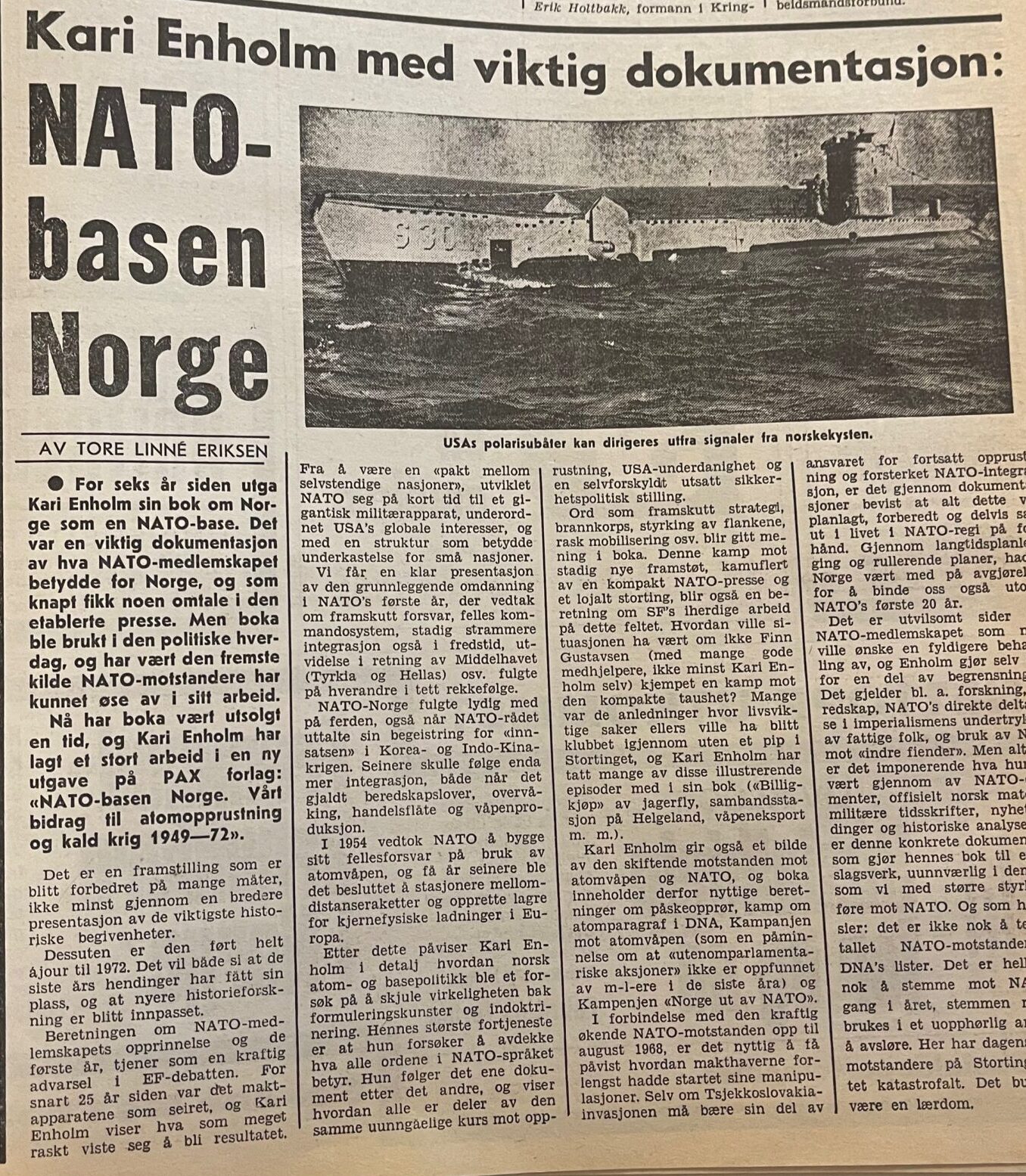(THIS ARTICLE IS MACHINE TRANSLATED by Google from Norwegian)
Six years ago, Kari Enholm published her book about Norway as a NATO base. It was an important documentation of what NATO membership meant for Norway, and which hardly received any mention in the established press. But the book was used in everyday politics, and has been the foremost source NATO opponents have been able to draw from in their work.
Today's opponents in the Storting have failed catastrophically
Now the book has been sold out for some time, and Kari Enholm has put a lot of work into a new edition at Pax forlag: NATO base Norway. Our contribution to nuclear armament and the Cold War 1949–72.
It is a representation that has been improved in many ways, not least through a broader presentation of the most important historical events. In addition, it has been completely updated to 1972. This means both that the events of recent years have been given their place, and that recent historical research has been incorporated.
The account of the origins and early years of NATO membership serves as a powerful warning in the EC debate. Almost 25 years ago, it was the apparatus of power that won, and Kari Enholm shows what very quickly turned out to be the result.
From being a "pact of independent nations", NATO developed in a short time into a gigantic military apparatus, subordinate to US global interests, and with a structure that meant submission to small nations.
We get a clear presentation of the fundamental transformation in NATO's first expansion – where decisions on advanced defence, joint command system, ever tighter integration also in peacetime, in the direction of the Mediterranean (Turkey and Greece) etc. followed each other in close succession.
NATO-Norway obediently followed along, even when the NATO Council expressed its enthusiasm for the "effort" in the Korean and Indochina wars. Later, even more integration was to follow, both when it came to emergency laws, surveillance, the merchant fleet and weapons production.

Use of nuclear weapons
In 1954, NATO decided to build its common defense on the use of nuclear weapons, and a few years later it was decided to station medium-range missiles and create storage facilities for nuclear charges in Europe.
After this, Kari Enholm demonstrates in detail how Norwegian nuclear and base policy became an attempt to hide reality behind art of formulation and indoctrination. Her greatest merit is that she tries to uncover what all the words in the NATO language mean. She follows one document after another, and shows how they are all part of the same inevitable course towards rearmament, US subservience and a self-inflicted compromised security policy position.
The same inevitable course towards rearmament, US subservience and a self-inflicted compromised security policy position.
Words such as advanced strategy, fire brigade, strengthening the flanks, rapid mobilization etc. are given meaning in the book. This battle against constant new advances, camouflaged by a compact NATO press and a loyal Storting, also becomes an account of SF's persistent work in this field. What would the situation have been like if Finn Gustavsen (with many good helpers, not least Kari Enholm himself) had not fought a battle against the compact silence? There were many occasions where vital matters would otherwise have been hammered through without a peep in the Storting. Kari Enholm has included many of these illustrative episodes in her book ("Billigkjøp" of fighters, communications station on Helgeland, weapons
export mm).
Kari Enholm also gives a picture of the changing opposition to nuclear weapons and NATO, and the book therefore contains useful accounts of the Easter uprising, the fight over the nuclear clause in the Norwegian Labor Party, the campaign against nuclear weapons (as a reminder that "extra-parliamentary actions" were not invented by ml -ers in recent years) and the campaign "Norway out of NATO".
Oppression of the poor
In connection with the sharply increasing NATO resistance up to August 1968, it is useful to be able to demonstrate how those in power had long ago started their manipulations. Although the invasion of Czechoslovakia must bear its share of responsibility for continued rearmament and strengthened NATO integration, it is proven through documentation that all this was planned, prepared and partially implemented under NATO auspices in advance. Through long-term planning and roll-
plans, Norway had taken part in decisions to bind us also beyond NATO's first 20 years.
There are undoubtedly aspects of NATO membership that some would like a fuller treatment of, and Enholm himself explains some of the limitations. It applies, among other things, to research, tools, NATO's direct participation in imperialism's oppression of poor people, and the use of NATO against "internal enemies". But all in all, it is impressive what she has gone through from NATO documents, official Norwegian material, military journals, news reports and historical analyses. It is this concrete documentation that makes her book an encyclopedia, indispensable in the battle that we must wage with greater strength against NATO. And as she says: It is not enough to count the number of NATO opponents in DNA's lists. Nor is it enough to vote against NATO once a year, the vote must be used in an unceasing effort to expose. Today's opponents in the Storting have failed catastrophically here. That should be a lesson learned.


